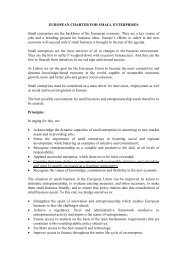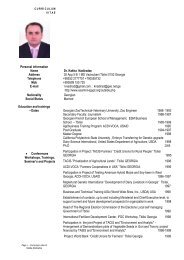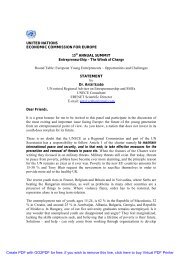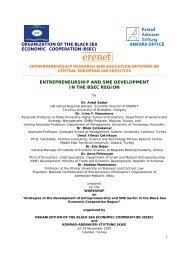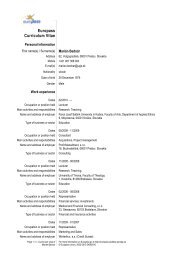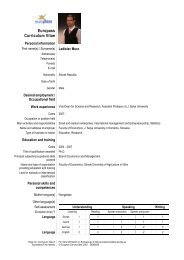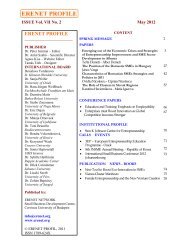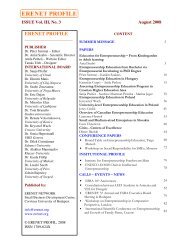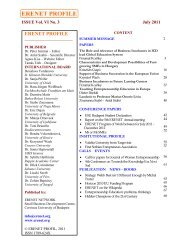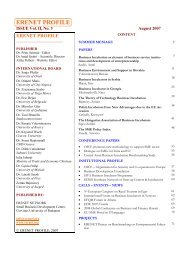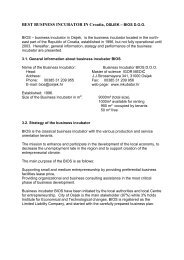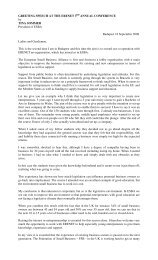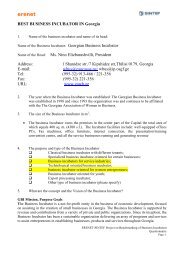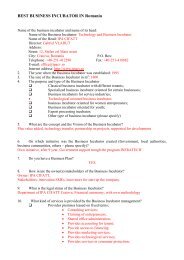Tomasz Marek Mickiewicz Born 24 December 1960 Nationality ...
Tomasz Marek Mickiewicz Born 24 December 1960 Nationality ...
Tomasz Marek Mickiewicz Born 24 December 1960 Nationality ...
Create successful ePaper yourself
Turn your PDF publications into a flip-book with our unique Google optimized e-Paper software.
ACADEMIC SUPERVISION - PHD PROGRAMMECompleted:• Kate Bishop – Internationalisation and performance in CIS manufacturing companies –September 2003 (awarded with minor amendments). Present position: full-time researcher,UCL (previously at the office of National Statistics)• Milan Nikolic – Inflation in Russia – June 2003 (awarded with minor amendments).Present position: part-time lecturer, University of Surrey.• Roman Zyla – Small Enterprises at Ukraine – January 2002 (awarded with minoramendments). Present position: World Bank researcher, Kiev, Ukraine.In progress:• Gian Fazio – Foreign Direct investment and employment growth of the transnationalcorporations• Jong-Kyu Lee (ORS award) – Economic growth in transition countries• Beata Manthey –Regional Labour Markets in Poland and Spain• Venla Sipila – Russian financial crisis of 1998PhD examiner for: London School of Economics, Imperial College London, University ofStaffordshireTEACHING ACTIVITYKey points on enabling activity in teaching:When I joined SSEES as a permanent member of staff in 1996, the number of BA studentstaking the only social science programme (Contemporary East European Studies) each yearwas less than 10. A major reform of our BA teaching in economics was undertaken jointly byProf. Alan Smith and myself. This resulted in the launch of a new BA in Economics andBusiness with East European Studies (EBEES) in 1999, shortly before SSEES merged withUCL. From the very outset, I have been the programme director for EBEES and retained thisrole until very recently. Initially, as the number of economists on the staff of SSEES variedbetween two and three, the launch of the programme was possible only thanks to co-operationwith Birkbeck College and the link established with them in which I played an active rolefrom the outset. Once we joined UCL, we further redesigned the programme to takeadvantage of synergies within UCL. The BA EBEES programme became the most successfulprogramme at SSEES, and a critical factor in placing SSEES on a far stronger financialfooting. EBEES remains the single most popular programme at SSEES and in addition tohome and EU candidates, it attracts the largest number of overseas students at SSEES.Demand is still rising and, as a consequence, the entry criteria have been continuouslyupgraded. The programme was awarded 23 out of <strong>24</strong> in the teaching quality assessment taken.It is listed amongst the best BA programmes in economics in the UK (see The Sunday Times2005 ranking). Its strength lies in an innovative approach, which combines discipline-basedknowledge with economic policy issues relevant to the core SSEES region. .I then turned my attention to the MA level, becoming the programme director for the MAPolitical Economy of Russian and Eastern Europe. Based on consensus with all my colleaguesat SSEES, the MA reform was introduced in two phases. First, as implemented since 2004, we<strong>Tomasz</strong> <strong>Marek</strong> <strong>Mickiewicz</strong>, page 5



